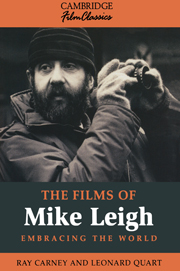Book contents
- Frontmatter
- Contents
- Editorial Note
- Acknowledgments
- Biographical and Cultural Introduction
- 1 Stylistic Introduction: Living beyond Consciousness
- 2 Fictitious Selves: Bleak Moments
- 3 Personal Freezing and Stylistic Melting: Hard Labour
- 4 Existence without Essences: The Kiss of Death
- 5 Defeating Systems of Knowing: Nuts in May
- 6 Losing Track of Who You Are: Abigail's Party
- 7 We Are the Hollow Men: Who's Who
- 8 Inhabiting Otherness: Grown-Ups
- 9 Manufactured Emotions: Home Sweet Home
- 10 Challenging Easy Understandings: Meantime
- 11 Holding Experience Loosely: High Hopes
- 12 Circulation Is the Law of Life: Life Is Sweet
- 13 Desperate Lives: Naked
- Epilogue: The Feel of Life
- Notes
- Filmography
- Bibliography
- Index
12 - Circulation Is the Law of Life: Life Is Sweet
Published online by Cambridge University Press: 05 June 2012
- Frontmatter
- Contents
- Editorial Note
- Acknowledgments
- Biographical and Cultural Introduction
- 1 Stylistic Introduction: Living beyond Consciousness
- 2 Fictitious Selves: Bleak Moments
- 3 Personal Freezing and Stylistic Melting: Hard Labour
- 4 Existence without Essences: The Kiss of Death
- 5 Defeating Systems of Knowing: Nuts in May
- 6 Losing Track of Who You Are: Abigail's Party
- 7 We Are the Hollow Men: Who's Who
- 8 Inhabiting Otherness: Grown-Ups
- 9 Manufactured Emotions: Home Sweet Home
- 10 Challenging Easy Understandings: Meantime
- 11 Holding Experience Loosely: High Hopes
- 12 Circulation Is the Law of Life: Life Is Sweet
- 13 Desperate Lives: Naked
- Epilogue: The Feel of Life
- Notes
- Filmography
- Bibliography
- Index
Summary
I do not make films which are prescriptive, and I do not make films which are conclusive. You do not walk out of my films with a clear feeling about what is right and wrong. They're ambivalent. You walk away with work to do. My films are sort of an investigation. They ask questions. They're reflecting.
–Mike LeighLeigh's work is energized by a productive doubleness. On the one hand, the characters are imagined to be as different as possible from each other and are allowed to figure utterly unique forms of thought and feeling. Yet they are simultaneously imagined to be members of a group, shaping their performances in relation to and in response to others. This doubleness is played out in Leigh's rehearsal process. One of the reasons he works with actors individually at first, and insists that they not discuss their characters with each other, is that he wants to avoid homogenizing their voices or blending their perspectives. He is absolutely committed to maximizing expressive, emotional, and performative differences. The uniqueness of the individual is virtually an article of faith.
Yet, at the same time, his characters are always imagined to be connected with others. Which is why the second stage of the rehearsal process goes in precisely the opposite direction to the first stage, involving joint improvisations (not unlike the ones Cyril and Shirley engage in) that put a premium on nimble, fluid, present-minded responsiveness.
- Type
- Chapter
- Information
- The Films of Mike Leigh , pp. 203 - 226Publisher: Cambridge University PressPrint publication year: 2000



